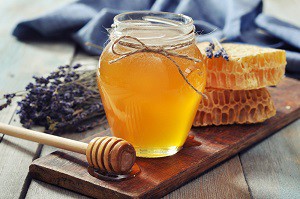Written by Jessica Patella, ND. Honey and honey bee pollen were both effective in relieving hot flashes and other symptoms of menopause in menopausal women undergoing chemotherapy for breast cancer.
Hot flashes, night sweats, pain during sex, hair loss, sleep disturbances, depression and forgetfulness are all common in both menopause and women undergoing chemotherapy for breast cancer (1). Research recently discovered that bee pollen has anti-hormonal effects and therefore may alleviate menopausal symptoms (1, 2, 3). A more recent study found both bee pollen and honey reduced menopausal symptoms in women with breast cancer receiving anti-hormonal treatment (1).
A total of 46 participants with breast cancer on anti-hormonal treatment (tamoxifen or aromatase inhibitors/inactivators) were recruited for this study and 31 completed the study. (The main reason for not completing the study was distaste of bee pollen). The participants were randomized to receive either a mixture of honey and bee pollen or pure honey. The participants were instructed to ingest a tablespoonful of either honey or honey with bee pollen for 14 days. This was followed by 14 days with no intervention, then the participants received the other treatment for another 14 days (1).
Menopausal symptoms in the participants were assessed using the Menopause Rating Scale. Improvements in menopausal symptoms were reported by 68.3% of those receiving honey and 70.9% of those receiving pollen (the difference between the groups was not significant) (1). Most improvements occurred with in 3-4 days of taking either honey or bee pollen.
When examining the results further, it was observed that participants who still had their ovaries benefited more from honey or pollen compared to those who had their ovaries removed. Those with ovaries had a 73.1% improvement in symptoms, compared to only 33.3% improvement in those who had their ovaries removed (based on Menopause Rating Scale; P=0.063) (1).
In conclusion, supplementing with honey and honey with bee pollen improved the symptoms of menopause in women with breast cancer (1). The honey alone was supposed to be the placebo in this trial, but was not inactive since both honey and honey with bee pollen improved symptoms. A future trial should include a better placebo option. Researchers also feel that honey and honey with bee pollen should be examined in healthy women with menopause symptoms (1).
Source: Münstedt, Karsten, Benjamin Voss, Uwe Kullmer, Ursula Schneider, and Jutta Hübner. “Bee pollen and honey for the alleviation of hot flushes and other menopausal symptoms in breast cancer patients.” Molecular and clinical oncology 3, no. 4 (2015): 869-874.
Posted June 16, 2016.
Jessica Patella, ND, is a naturopathic physician specializing in nutrition and homeopathic medicine and offers a holistic approach to health. She earned her ND from Southwest College of Naturopathic Medicine in Tempe, AZ, and is a member of the North Carolina Association of Naturopathic Physicians. Visit her website at www.awarenesswellness.com.
References:
- Munsteadt K, et al. Bee pollen and honey for the alleviation of hot flashes and other menopausal symptoms in breast cancer patients. 2015 Molecular and Clinical Oncology 3: 869-874.
- Saric A, et al. Antioxidant effects of falvonoid from Croatian Cytus incanus L. rich bee pollen. 2009 Food Chem Toxicol 47: 547-554.
- Winther K, et al. Femal, a herbal remedy made from pollen extracts, reduces hot flushes and improves quality of life in menopausal women: A randomized, placebo-controlled, parallel study. 2005 Climacteric 8: 162-170.

